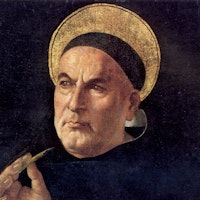The soul exists independent of the body, and continues after the body dies, taking up a new spiritual body.
Saint Thomas Aquinas

The Soul Exists
Topic: Life Beyond Death & the Spirit World
The soul exists independent of the body, and continues after the body dies, taking up a new spiritual body.
Thomas Aquinas, born into a noble family in Roccasecca, Italy, was a renowned Dominican friar, Catholic priest, and Doctor of the Church. As an Italian Dominican, he was profoundly influential in the tradition of scholasticism, earning the titles of Doctor Angelicus and Doctor Communis. His academic journey began at the University of Naples, where he first encountered Aristotle's works that would greatly shape his future philosophical and theological perspectives. Inspired by these ideas, Aquinas joined the Dominican Order, a religious community founded by Saint Dominic dedicated to preaching and teaching.
Aquinas later traveled to Paris to pursue further studies at the prestigious University of Paris, becoming a student of Albert the Great. As a distinguished scholar and theologian, Albert the Great imparted invaluable insights that significantly influenced Aquinas's development. After concluding his studies in Paris, Aquinas returned to Italy, imparting his knowledge as a lecturer at the University of Naples and the University of Rome. In addition to his educational pursuits, he served as an advisor to the Pope, strengthening his bond with the Church.
Throughout his career, Aquinas penned numerous works, the most notable being the Summa Theologica. This extensive treatise synthesized Christian theology and philosophy, segmented into three parts that discuss God, man, and the Christian life respectively. This work, among others, solidified Aquinas's substantial impact on Catholicism, providing defensible arguments against challenges from other religious traditions and contributing significantly to the development of Catholic doctrine. The philosophy and theology of Aquinas, known as Thomism, remains influential in contemporary Catholic thought. Predicated on the reconciliation of faith and reason, Thomism has evolved with scholars like John of St. Thomas, Francisco Suarez, and Jacques Maritain further refining its principles. Its application extends beyond theology, influencing fields such as philosophy, law, economics, and facilitating dialogue between religion and science.
Croissant, Kay, and Catherine Dees. Continuum, the Immortality Principle: Based on an Exhibit Presenting Human Speculations on the Possibility of Continuing Consciousness, First Shown at the California Museum of Science and Industry. Croissant, 1978, p. 23 [Saint Thomas Aquinas].

Saint Thomas Aquinas
Theme: Our Soul
Copyright © 2017 – 2024 LuminaryQuotes.com About Us

Saint Thomas Aquinas (c. 1225 – 7 March 1274)
Saint Thomas Aquinas (c. 1225 – 7 March 1274) was an Italian Catholic philosopher and theologian in the scholastic tradition, known as Doctor Angelicus, Doctor Universalis. He is the most famous classical proponent of natural theology. He gave birth to the Thomistic school of thought (Thomism), which has long been the primary philosophical and theological approach of the Catholic Church.
Saint Thomas Aquinas lived at a critical juncture of western culture when the arrival of the Aristotelian corpus in Latin translation reopened the question of the relation between faith and reason, calling into question the modus vivendi that had obtained for centuries. This crisis flared up just as universities were being founded. Thomas, after early studies at Montecassino, moved on to the University of Naples, where he met members of the new Dominican Order. It was at Naples too that Thomas had his first extended contact with the new learning. When he joined the Dominican Order he went north to study with Albertus Magnus, author of a paraphrase of the Aristotelian corpus. Thomas completed his studies at the University of Paris, which had been formed out of the monastic schools on the Left Bank and the cathedral school at Notre Dame. In two stints as a regent master Thomas defended the mendicant orders and, of greater historical importance, countered both the Averroistic interpretations of Aristotle and the Franciscan tendency to reject Greek philosophy. The result was a new modus vivendi between faith and philosophy which survived until the rise of the new physics. The Catholic Church has over the centuries regularly and consistently reaffirmed the central importance of Thomas’s work, both theological and philosophical, for understanding its teachings concerning the Christian revelation, and his close textual commentaries on Aristotle represent a cultural resource which is now receiving increased recognition.
―Saint Thomas Aquinas [Stanford Encyclopedia of Philosophy, revised May 23, 2014].
Jacques Maritain
Additional St. Thomas Aquinas Quotes